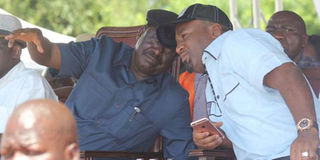The winners and losers in media contest over electoral reforms

Cord leader Raila Odinga (left) shares a word with Mombasa County Governor Hassan Joho during a prayer rally at Kirembe grounds in Kisumu on June 2, 2016 for victims killed during anti-IEBC demos. PHOTO | TOM OTIENO | NATION MEDIA GROUP
What you need to know:
Oversize egos and pride have become the greatest hindrance to bringing the much-needed closure to the impasse.
The Opposition seems to be the biggest winner in the visibility game.
The media is crucial in not only setting the agenda, but also creating attention.
In print, Mr Odinga occupied twice as many headlines as any other politician.
The continued standoff over the Independent Electoral and Boundaries Commission has been the most dominant news item in the country for the past month.
The news discourse has centred on the fate of the current IEBC commissioners, with the Opposition seeking dialogue outside the formal structures of Parliament while the Jubilee coalition insists on dialogue within parliamentary structures.
Unsurprisingly, while both sides seem reconciled to the reality that electoral reforms are inevitable in order to have a credible election, oversize egos and pride have become the greatest hindrance to bringing the much-needed closure to the impasse.
As the crisis mutates to the point where politicians are now facing hate speech charges, the Opposition seems to be the biggest winner in the visibility game.
Before the clamour for electoral reform went to the streets, the Opposition coalition Cord was essentially on the margins of the public imagination with reports of nascent disagreements over the choice of its flag bearer.
Indeed, the Opposition seemed always on the back foot, with its leaders concerned more and more with protecting “strongholds” than venturing into new ones.
SETTING THE AGENDA
The fight over IEBC is changing all that. Mr Raila Odinga, the opposition chief, has managed to direct media discourse for the past month.
As a media researcher, my analysis of the news discourse in the past month confirms significant shifts in media representation.
The media is crucial in not only setting the agenda, but also creating attention.
It tells us what matters and how best to evaluate it.
In creating attention, the media subtly locates and positions prominent actors in a reductive binary of winners and losers, antagonists and protagonists, or weak and strong oppositional pairing.
The leaders gaining the most attention often benefit the most politically from the news discourse that arises, even when the valence of these attentions shifts between extremes. Ask Donald Trump.
This is because sustained media attention creates presence and ignites a “discovery” desire in audiences, which over time stimulates political capital.
In the past one month, the Opposition has not only gained the most media attention but has essentially driven it.
In virtually all prime times news, Raila Odinga was mentioned more times than any other political leader, including the President.
For every minute that President Uhuru Kenyatta and Deputy President William Ruto gained, Raila Odinga had three times more.
In any given six days in a week in the past month, Mr Odinga and the Opposition have occupied the first three minutes of all major TV stations’ prime time news.
Besides, in most of these instances, the attention the President and his deputy received was directly linked to the instances where they implicitly or explicitly addressed Mr Odinga.
In print, Mr Odinga occupied twice as many headlines as any other politician.
Recent examples of how the opposition is reaping extensive media attention include the Madaraka Day celebrations, the burial of former Cabinet minister Soita Shitanda, and the ongoing drama over hate speech.
Madaraka Day, one of Kenya’s most important days and on the occasion of which the President usually lays out the achievements the nation has attained, was overshadowed by quarrels over the IEBC.
In fact, the expensively assembled event’s media coverage was, during the prime time news, reduced, to the extent to which the President and his deputy responded to the agenda set by the Opposition in a rally at Uhuru Park that was held on the same day.
The perfect moment to unite the nation was bypassed.
So far, despite the rapprochement from the Jubilee coalition over the IEBC issue, the President and his deputy appeared to have failed to take charge of a process that should otherwise be to their benefit.
As seen from what prompted the “Pangani Six” saga, the matter risks stoking ethnic tensions.
Dr Omanga is the head of the Publishing and Media Studies Department at Moi University. [email protected]




